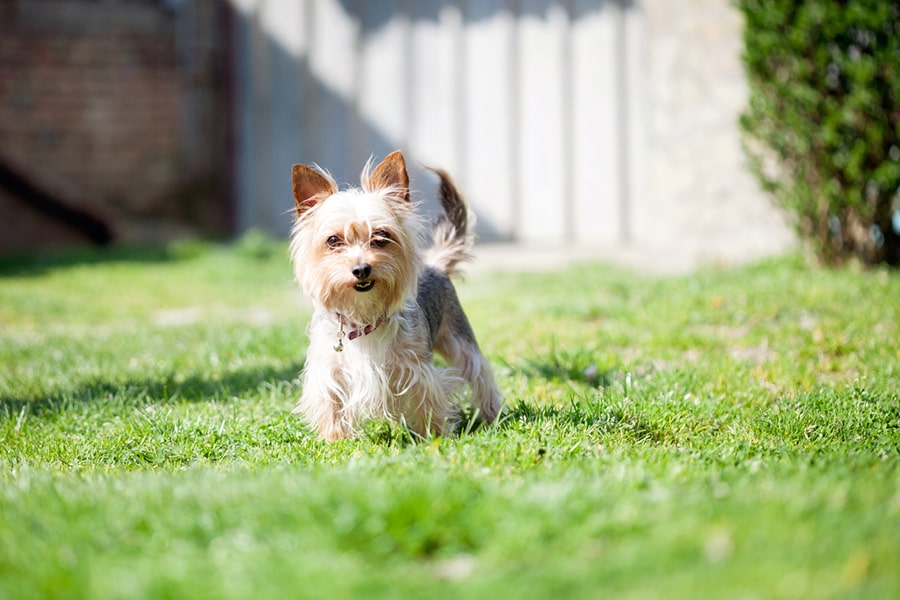Egyptian Mau Cat Facts
Egyptian Maus are definitely one-of-a-kind cats. Learn all about this breed’s history, health, and personality.
Yorkshire Terriers, commonly known as Yorkies, are small dogs with big personalities. Known for their affection, adventurous spirit, and intelligence, there’s lots to love about these little lap dogs! That’s probably why they’re America’s top toy breed.
Yorkies are part of the terrier group. The terrier group is a large one with dogs of many shapes and sizes. Though their appearance can vary greatly, terrier breeds all have some of the same personality traits, like being energetic and mischievous.
“Terrier” comes from the Latin word “terra,” which means “earth.” Terriers earned this name thanks to their love of digging for ground-burrowing creatures, like badgers, foxes, moles, rats, and other rodents. Most terriers were originally bred to dig out and chase away vermin to protect crops, stored foods, and stables.
The Yorkie gets its name from the part of England it originated in, Yorkshire. It’s believed that the Yorkshire Terrier came from cross-breeding a long line of other terriers, like the Clydesdale Waterside, Paisley, Skye, Dandie Dinmont, and the Black and Tan.
With the Yorkie’s success in the show ring, it became the favorite lap dog breed of the British elite. Yorkshire Terriers made their way to the United States in 1872.
The Yorkie’s coat is tan and dark, steel blue with a glossy hue. The texture is fine and straight. Show ring Yorkies flaunt floor-length locks, but you can trim a Yorkie’s hair to any length desired.
So, you’re probably wondering, “How big do Yorkies get?” The answer is not very big at all, making these dogs perfect for picking up and placing in your lap for some snuggles. A full-grown Yorkie, male or female, will get to be between 8-9 inches tall at the shoulder and no more than 7 lbs.
How long do Yorkies live? Like other small breeds, they can live for quite a long time. Their average lifespan is 14-16 years. A healthy Yorkie can live even longer--that is why regular check-ups are so important.
Yorkie Terriers are bold, curious dogs. They’re always up for adventures and will get their exercise on their own, just playing and romping around the house. But, short walks on the leash are still encouraged for exercise.
Yorkies like to bark, so they’re a good choice if you want a dog that will alert you to possible intruders. However, you can train a Yorkie not to bark if you’re looking for a quiet companion.

While no pet is truly hypoallergenic, those that don’t shed heavily or have a lower level of protein in their fur may produce fewer allergens and are said to be a better choice for people affected by pet allergies. The allergy-triggering proteins found in dogs’ and cats’ fur are also found in their saliva and skin, so “hypoallergenic” pets can still cause a reaction for some people.
So, do Yorkies shed? The answer is no—Yorkies do not shed in the traditional sense of the word. But, that’s not to say you’ll never find stray hairs of your Yorkie around your home.
Yorkies’ coats grow similarly to the way people’s hair grows in that their hair strands are pushed out by the body when they’ve become old, and then they’re replaced with new ones. Each strand of hair can get very long unless trimmed before it falls out during the growth cycle.
The Yorkie’s coat requires regular maintenance due to its texture and quick growth. You’ll want to brush your Yorkie’s coat at least every other day to make sure there are no tangles or debris in it.
You can trim your Yorkie’s hair short if you’d like, and doing so may also help them see better and prevent eye and facial irritation. Many Yorkie owners use bows or elastic hair bands to pull the hair away from their pup’s face for the same purposes and as a fashion statement for this bold breed.
Regular bathing is another good way to maintain a Yorkie’s coat. Monthly baths are recommended, but you can do it as needed in case your pup decides to roll in the mud. Since frequent bathing can dry the skin, it’s always a good idea to ask your veterinarian for a prescription shampoo that won’t strip away moisture. You’ll want to use conditioner as well on your Yorkie’s coat to soften it and bring out its natural luster even more.
Be sure to start brushing and bathing your Yorkie from the get-go, especially if you’ve adopted them at a young age. The earlier they get accustomed and comfortable with it, the better since coat grooming is an essential part of basic care for Yorkies. You want it to be a pleasant experience for both of you.
While you’re cleaning your pup’s coat, always check their ears and eyes for possible infection, and take a peek at their pearly whites too. Small breeds are prone to oral problems due to their size. Sometimes their little mouths can’t quite accommodate all those adult teeth!
Good dental hygiene is also imperative for Yorkies and any pet. But, it’s often forgotten in basic care, which is why the majority of dogs and cats show some signs of periodontal disease by their third birthday.
You can make oral hygiene part of your at-home care regiment for your Yorkie to help them live healthier. Brushing your dog’s teeth is easier than you’d think!
In addition to brushing your dog’s teeth at home, it’s recommended to visit the vet for an oral examination and professional cleaning at least once a year.

Yorkie Terriers are known to be difficult to house train. This is not because of a lower potential to learn to go potty outside, but usually due to improper training methods. For instance, carrying the dog in and out of the house instead of helping them learn to go on their own when their bladder says it’s time. Yes, the temptation to pick up and carry around this adorable little dog is irresistible, but teaching them to get by on their own four legs is more beneficial.
In general, Yorkies are receptive to other kinds of training, especially if it will bring them attention and praise, like performing cute tricks.
Speaking of Yorkies performing cute tricks reminds me of an interesting story near and dear to the hearts of my family members that I’d like to share with you.
During World War II, a tiny female Yorkie, who would later be named Smoky, was found in a foxhole and adopted by a relative of mine named Bill Wynne, serving in the U.S. Army Air Corps. She became the first therapy dog on record, boosting the troops’ morale with tricks that included riding a scooter, walking a tightrope, and spelling her name with cut-out letters.
Her intelligence, loyalty, and size made her capable of pulling a telephone line through a 70-foot pipe to complete the construction of a critical airfield. Since communication wires had to be run underground near combat zones, men would have had to spend days digging a trench to complete the job and would’ve been exposed to enemy bombing. Smoky did it seamlessly in just minutes!
This amazing Yorkie was awarded eight battle and 12 combat mission stars and survived typhoons and 150 air raids. After returning to America with Wynne at the war’s end, Smoky went on to entertain across the country at veterans and children’s hospitals, theaters, and on television programs, doing 42 television shows without repeating a single trick.
Her popularity was credited with renewing people’s interest in the Yorkie breed, and she is now memorialized in six places throughout the country to honor her dedication to helping people. Smoky was very loved by all the people she helped.
That just goes to show that these little dogs can learn some pretty impressive tricks with proper training and lots of love!
According to our claims data,** the top five health issues for Yorkies are an upset stomach, allergies,* skin irritation, ear infections, and diarrhea. Learn more about the 5 Most Common Dog Diseases for all dogs.
Yorkies are also known to have higher instances of the following conditions, but for the most part, Yorkies are pretty healthy pups and live long lives.
Don’t forget to take your Yorkie for yearly check-ups with their veterinarian to keep on top of their overall health.
**Internal Claims Data, 2015-20
The information presented in this article is for educational and informational purposes only and does not constitute or substitute for the advice of your veterinarian.
(opens new window)